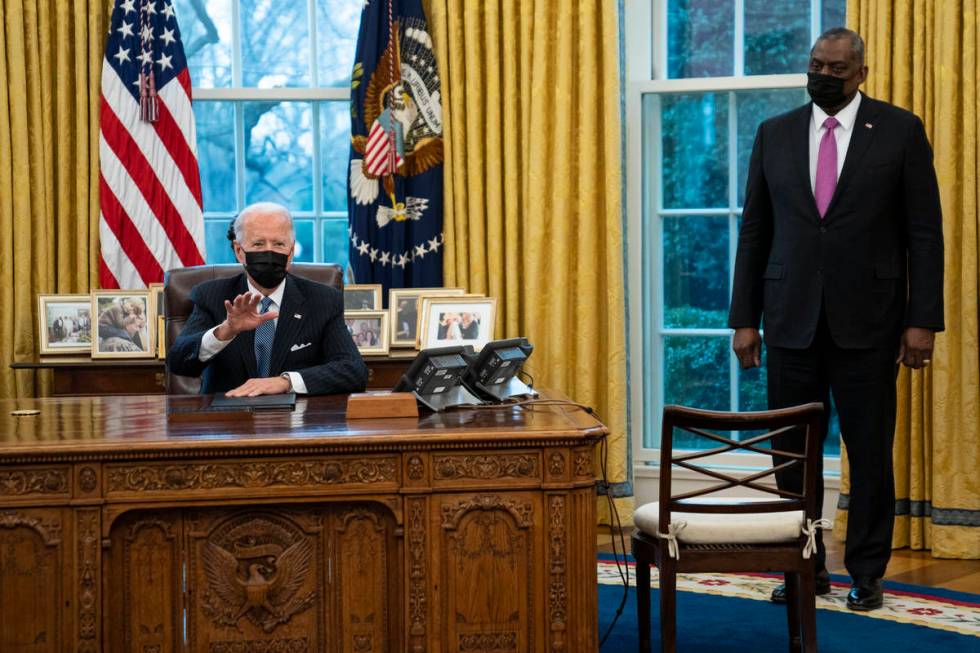Transgender service members in Nevada cheer Biden order

When former President Donald Trump enacted a ban on transgender people serving in the U.S. military, Las Vegas resident and 10-year Air Force veteran Frankie Perez’s hopes of re-enlisting as an officer were dashed.
Instead, he planned to open a therapy practice after completing his education.
On Monday, hours after President Joe Biden signed an executive order reversing the Trump ban — which was a reversal of an Obama-era policy that allowed trans individuals to serve openly without fear of punishment — Perez has options.
“I am highly considering going back,” Perez said Monday. “I can enlist, or, now that I have my degree, I can go in as an officer.”
He was an active participant in roundtables and meetings with prospective Democratic presidential candidates during Nevada’s caucus season leading up to the 2020 election, and he described securing a face-to-face pledge to end the ban from now-Vice President Kamala Harris during one such discussion.
“It’s great to know they followed through with what they said they were going to do,” Perez said. “There are trans folks in this country and really all around the world who want to serve and now have this great opportunity.”
Monday’s executive order was an expected move for Biden, who served as vice president when former President Barack Obama formally opened up the military to transgender identities in 2016. Biden’s order also provides protection from involuntary separation or discharge due to gender identity and seeks to correct any previous dishonorable discharges for that reason.
“What I’m doing is enabling all qualified Americans to serve their country in uniform, and essentially restoring the situation as it existed before, with transgender personnel, if qualified in every other way, can serve their government in the United States military,” Biden said just before signing, according to the White House.
Fit to serve
“If you’re fit to serve in the military, and you can get your job done, then it shouldn’t matter what you identify as,” said Spc. Sam Hunt, a technician with the Nevada Army National Guard in Reno who became the state guard’s first openly transgender soldier in 2015.
Hunt continued to serve after the Trump administration enacted the ban and will reach 12 years in the military in March. He said his unit accepted his transition and “went above and beyond” to help him fill out the necessary paperwork with the Department of Defense to be formally recognized as a male soldier.
Although Monday’s executive order is a welcome step, Hunt said additional training at the unit level will be needed to create a culture of inclusivity throughout the military.
“I think there will be a lot of need for education and understanding,” Hunt said. “Most people (in the military) don’t have a grasp on the culture, and there are individuals who may not understand what they need to do to be inclusive.”
Perez, who also received a warm reception from his unit upon transitioning, agreed that a diversity and inclusivity training session should be added to the many annual and biannual trainings military members receive.
“A lot of people (in the military) just generally don’t know about us,” Perez said. “I’m the first and only trans person they’ve met. Sure, we’re all a little different, but we’re more similar than different. We all had our reasons for joining, and that’s what makes the military beautiful.”
Ending the trans ban is widely supported by the American public, including some 60 percent of Nevadans, according to surveys conducted by the Democracy Fund and UCLA, in partnership with USA Today. About 61 percent of Americans support lifting the ban, including 75 percent of Democrats, 60 percent of independents and 44 percent of Republicans.
“The transgender ban that was implemented by the previous administration was not asked for, wanted or needed,” said Dr. Marvin Carter, who founded a Washington, D.C. and Las Vegas-based advocacy group, Helping our Brothers and Sisters, to assist LGBTQ veterans after he was discharged from the U.S. Marine Corps in 1986 for being a gay man.
“This was simply a discriminatory action that was taken against well-qualified military personnel to satisfy a very small and narrow group/niche within our society,” Carter said.
The LGBTQ Center of Southern Nevada, more commonly referred to as The Center, released a statement Monday in support of the executive order and calling for federal legislation to provide further nondiscrimination protections for LGBTQ individuals.
“The ban was a vivid illustration of the discrimination that many transgender Americans experience all too often,” the statement read. “The reaction to the military ban was an example of a bipartisan group of leaders coming together to do the right thing and reject anti-LGBTQ discrimination.”
Contact Rory Appleton at rappleton@reviewjournal.com or 702-383-0276. Follow @RoryDoesPhonics on Twitter.